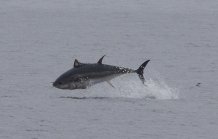Articles
Articles

Bluefin Tuna. Credit: Tom Horton
€4 million project uses cutting-edge technology to enhance the habitats of key fish species
A cross-Channel partnership will use innovative underwater acoustic tracking technology to identify the environmental conditions a range of important marine species need in order to thrive.
The €4million FISH INTEL project, supported by €2.8million from the European Regional Development Fund via the Interreg France (Channel) England programme, will focus on a series of sites along the coastlines of southern England, northern France and Belgium.
Through a combination of fish tracking and underwater video surveys, the project will establish a comprehensive picture of fish movements and the habitats individual species prefer.
It will also contribute to a growing amount of data assessing the impact of fishing, climate change and other human activities – such as the development of offshore renewable energy sites and offshore mariculture – on the Channel/Manche region.
The FISH INTEL project involves research organisations across the UK, France and Belgium who will work directly with fishers, regulators and industry representatives in the three countries.
Across seven sites, the project will monitor marine species including European bass, pollack, crawfish and bluefin tuna, which are considered commercially important for the region.
The resulting data about their movements, and the habitats they occupy, will then be shared with other key stakeholders, enforcement bodies and policymakers.
Ultimately, it is hoped the research will enable authorities across the region to implement Ecosystem Based Fisheries Management (EBFM) programmes with the aim of enhancing the condition and water quality in these habitats, as well as enabling activities – such as fishing, civil engineering projects and extract industries – to function in a sustainable way.
It is also designed to bring about greater collaboration and communication between a range of different partners with a common interest in the Channel/Manche region.
Dr Emma Sheehan, Associate Professor of Marine Ecology at the University of Plymouth, is the project’s Principal Investigator. She has previously coordinated a number of projects using cutting edge technology to advance conservation policies that benefit both the fishing industry and the environment.
She said: “There are increasing demands and stresses being placed on the marine environment. And over the coming years, the impact of factors such as human activity and climate change has the potential to grow exponentially. This is an exciting and far-reaching project and all the partners have a shared aim to protect the way of life in our coastal habitats and communities. But if we are to develop solutions which preserve our coasts, and the species that rely on them, we first need to understand which habitats we are trying to protect.”
Dr Lucy Hawkes, from the University of Exeter, who is a co-investigator on the project, said: “We are delighted to be part of this exciting project that will really increase the regional significance of our work as part of Exeter Marine. The rich marine resources we enjoy in the southwest are shared across the channel so collaborative work like this is key for future successful stewardship.”
Carolyn Reid, Programme Manager, Interreg France (Channel) England programme, said: “The Channel area is home to many fishery-dependent communities, with significant importance for local economies and employment. We were impressed by the ambition of FISH INTEL in using innovative new technology and bringing together a wide range of cross-border stakeholders, in order to improve the sustainable management of marine resources. As a result, the project is expected to significantly enhance the ecological status of our coastal waters while ensuring they remain commercially sustainable.”
Date: 9 March 2021
